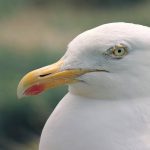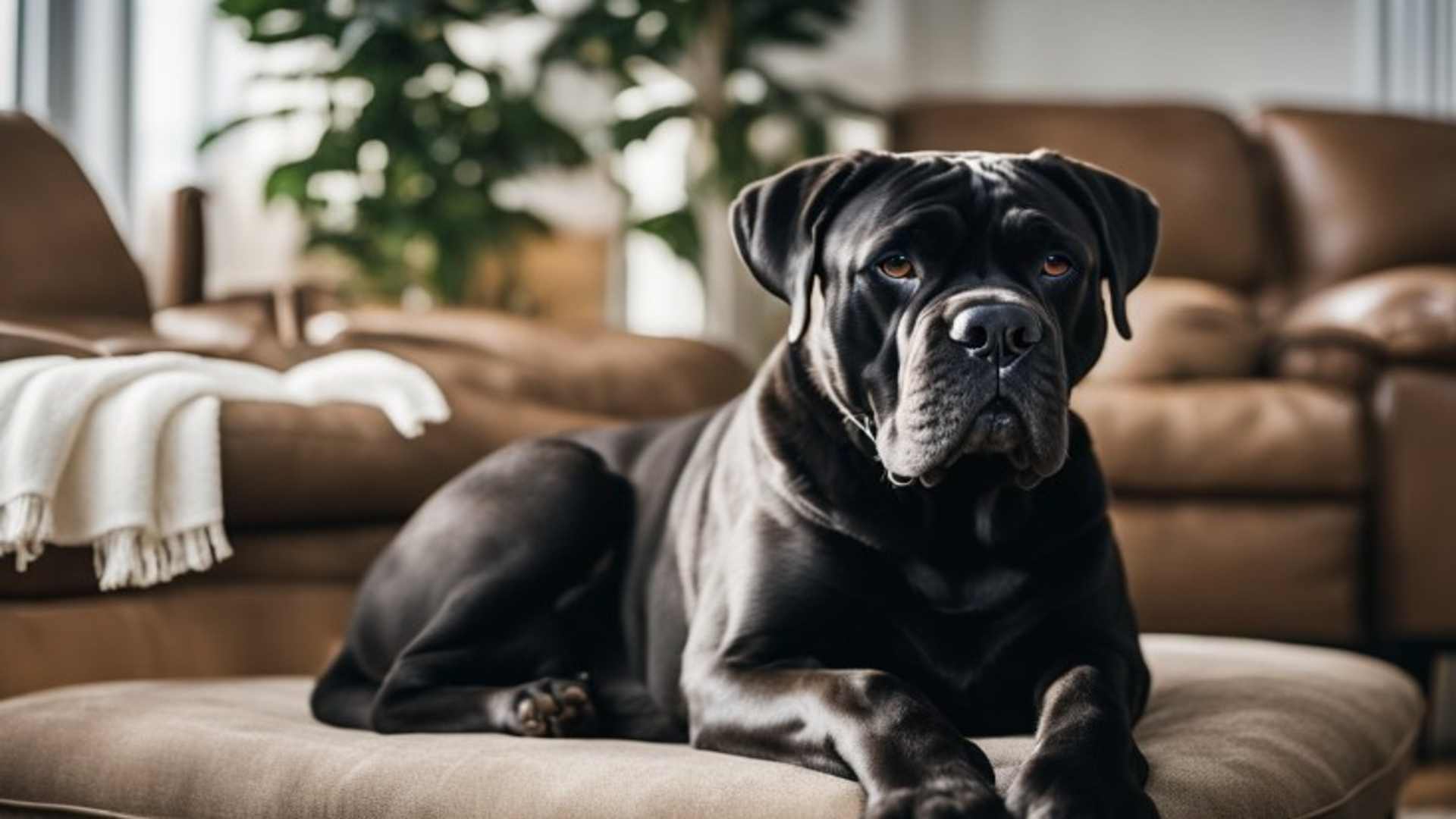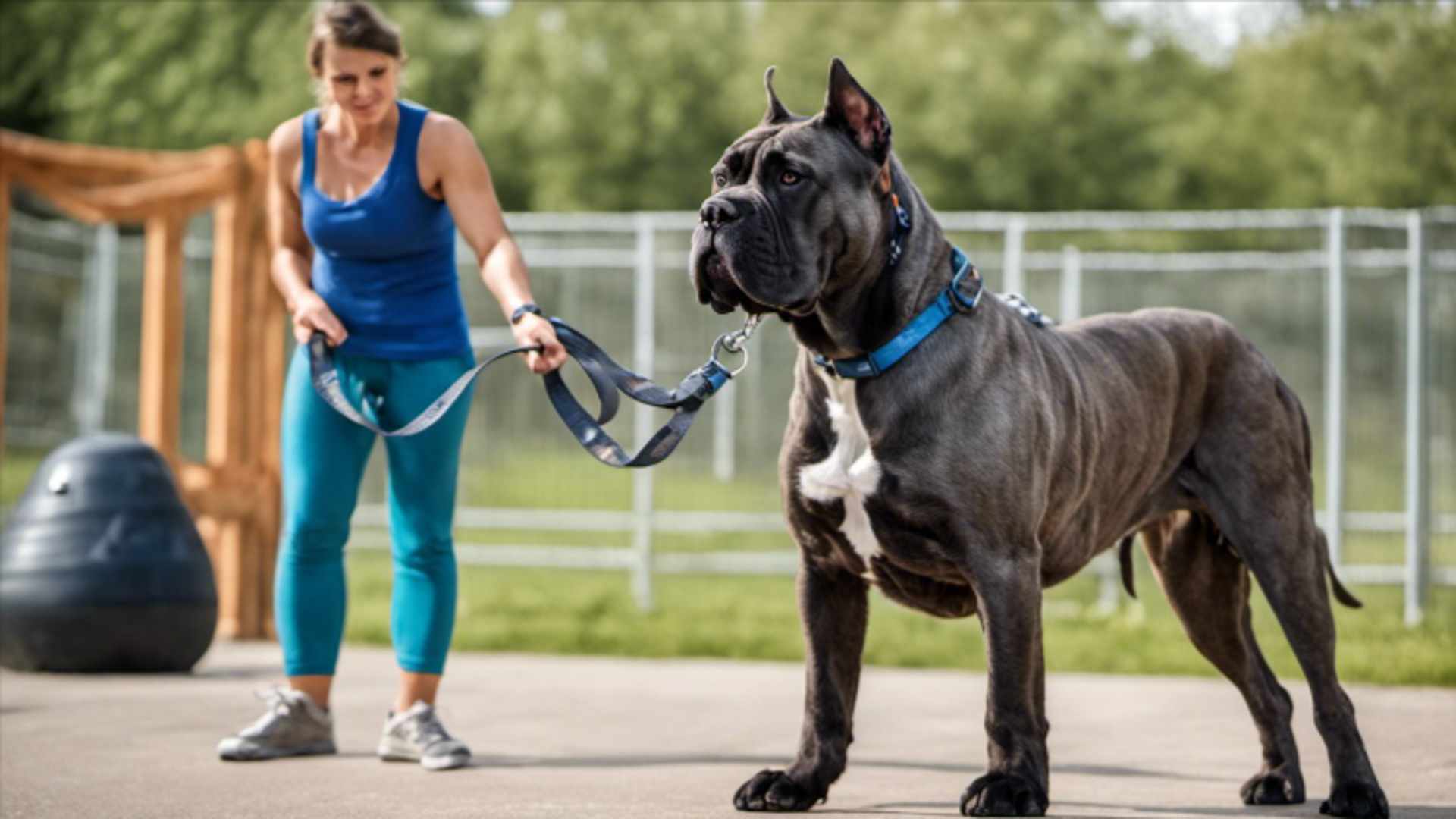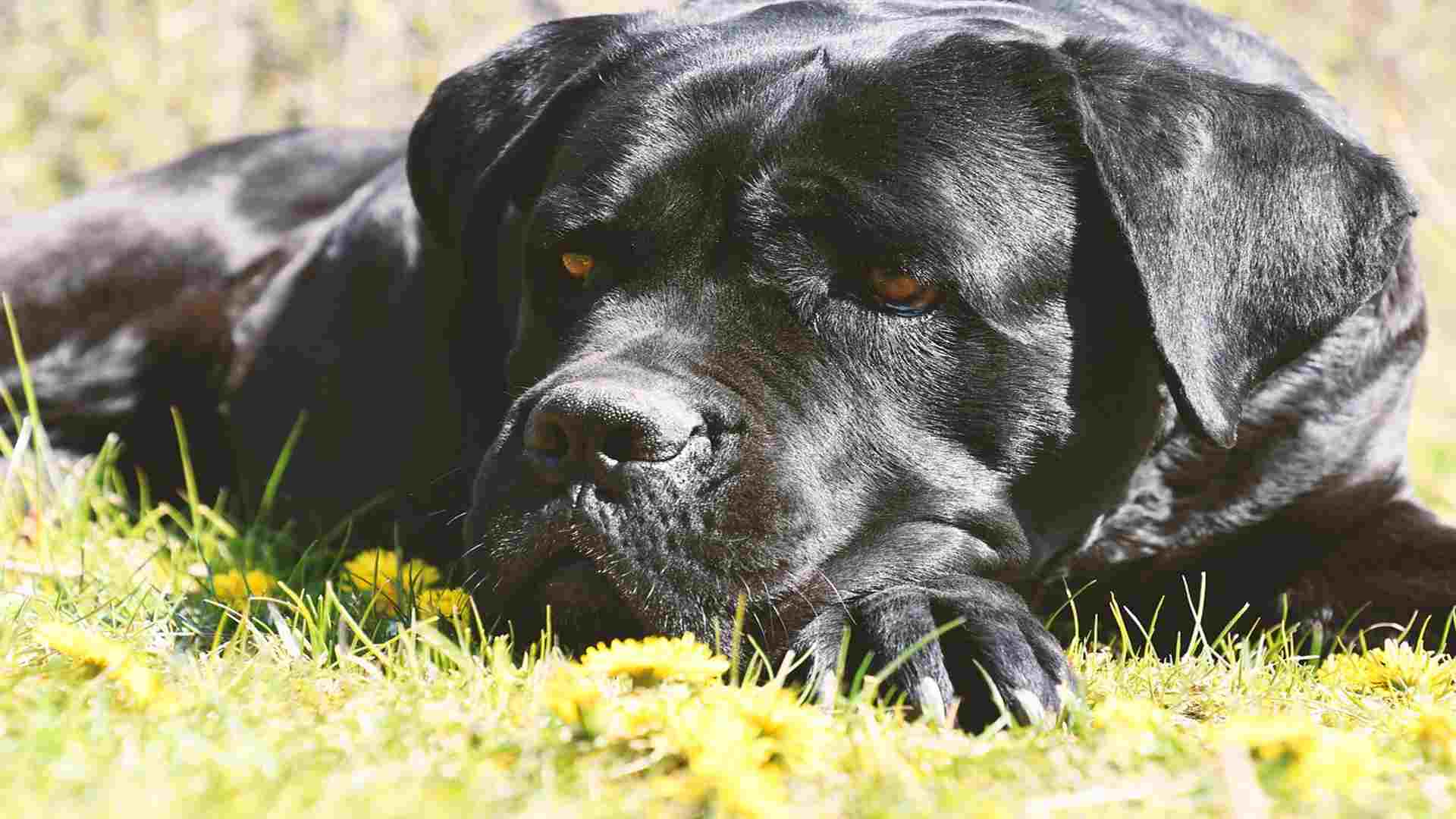Have you ever heard someone claim their Cane Corso is a “King” and wondered what that means? While the term “King Cane Corso” catches your ear, it’s not actually an official breed or type.
In this blog post, I’ll debunk myths and compare these so-called King Corsos with the well-known Cane Corso. Dive in to discover the truth behind these majestic dogs!
Key Takeaways
- The term “King Cane Corso” is not a recognized separate breed but rather an unofficial label some breeders use to market larger-sized or perceived superior Cane Corsos.
- Both King and standard Cane Corsos require proper socialization, training, and a high – quality diet formulated for large breeds to maintain their health and temperament.
- Daily exercise is vital for the physical and mental well – being of these dogs; engaging them in physical activities and brain games helps prevent boredom and destructive behavior.
- Despite claims from breeders about King Cane Corsos having better temperaments or family interactions, all traits largely depend on the individual dog’s upbringing, environment, genetics, and training.
Overview: King Cane Corso vs. Cane Corso
Looking for a quick answer to which is better, King Cane Corso or Cane Corso?
If so, we have summarized their differences for you below:
| Feature | King Cane Corso | Cane Corso |
|---|---|---|
| Size | On average, 28-32 inches tall | Standing 23-28 inches tall |
| Weight | Often reach weights upwards of 150 pounds | Typically weighing between 90-120 pounds |
| Temperament | Confident, assertive, and dominant | Confident, intelligent, and loyal |
| Exercise Needs | High exercise needs | Moderate exercise needs |
| Grooming Needs | Low grooming needs | Moderate grooming needs |
| Health Concerns | Prone to hip dysplasia, bloat, and heart issues | Prone to hip dysplasia and eye issues |
| Training | Requires firm and consistent training | Requires positive reinforcement training |
Moving on from our introduction, let’s dive into the realm of the Cane Corso, an impressive breed known for its strength and nobility. It’s important to clarify a common misconception right off the bat: King Cane Corsos are often mentioned within dog communities, but you may be surprised to learn that they don’t exist as a separate breed.
This term is typically a marketing tactic used by some breeders to describe larger or supposedly superior specimens of the standard Cane Corso.
In this comparison, we’ll dissect the myths and lay out what sets a typical Cane Corso apart in terms of physicality, temperament, and more. Despite some breeders promoting ‘King’ variants with overblown claims like enhanced size or longevity compared to regular Cane Corsos, these narratives simply do not hold up to scrutiny.
Each Cane Corso should be valued for its unique traits without falling prey to hype or inflated prices due to deceptive branding strategies. Let’s get down to brass tacks about these majestic Italian Mastiffs and set aside any illusions about so-called “king” versions.
Read also: Cane Corso vs. Mastiff: The Definitive Comparison ([year])
Temperament and Personality Comparison
Discover how the regal disposition of a King Cane Corso contrasts with the classic Cane Corso’s personality, and see which might be your perfect canine companion as we delve into what sets these two apart in spirit.
King Cane Corso Temperament
The King Cane Corso temperament is often described with a sense of majesty and poise, mirroring their impressive physical stature. You might hear breeders talk about these dogs as if they possess a regal aura, promoting an image of calm confidence and intelligence.
They are portrayed to be loyal protectors of their home and family, always alert and ready to guard against strangers. Their athleticism and strength supposedly translate into a reliable canine companion that’s both powerful and controllable.
However, it’s crucial to understand that the concept of the “King” distinction in Cane Corsos isn’t recognized by major kennel clubs like the American Kennel Club (AKC). The narrative around this variant is more myth than reality.
Claims suggesting vast differences in personality traits like heightened loyalty or superior guard dog qualities are based on anecdotal evidence rather than scientific fact. Don’t get misled by breeders attempting to market so-called King Cane Corsos at inflated prices—temperament largely depends on individual upbringing, training, and genetics within the traditional breed standards.
Cane Corso Temperament
Cane Corsos stand out for their impressive boldness, exuding confidence with every step they take. These dogs possess a caring nature that endears them to their families, and they’re fiercely loyal to those they love.
Known for being protective, a Cane Corso makes an excellent guard dog, always on alert to keep its home safe from strangers.
You’ll find that this breed balances strength with tenderness skillfully. Despite their powerful build and sometimes intimidating appearance, Cane Corsos are affectionate with family members and can form strong bonds with children when properly introduced.
Their temperament requires dedicated socialization; these intelligent dogs thrive on positive interactions and clear training guidelines right from puppyhood. With consistent guidance, your Cane Corso will grow into a well-mannered canine citizen capable of agility, demonstrating both resilience in tasks like dock diving and gentleness in daily life.
Training and Socialization Requirements
Understanding the nuances of training and socialization for King Cane Corsos versus traditional Cane Corsos is pivotal to ensuring a well-adjusted, obedient pet; delve in further to uncover the tailored strategies that align with each breed’s unique needs.
King Cane Corso Training Needs
Training a King Cane Corso means establishing yourself as a leader from the start. These majestic dogs require consistent, firm training to fully develop their admirable qualities.
- Establish clear rules and boundaries early on to guide your King Cane Corso’s behavior.
- Use positive reinforcement techniques such as treats, praise, and play to reward good behavior.
- Socialization is crucial; expose your King Cane Corso to different people, pets, and environments.
- Start obedience training as early as possible; these dogs are smart and learn commands quickly.
- Practice patience when training; although intelligent, King Cane Corsos can be stubborn at times.
- Ensure training sessions are short and engaging to keep your dog’s attention focused.
- Address any signs of aggression immediately with professional help if necessary.
- Incorporate daily exercises like walks or runs into the routine for better focus during training sessions.
- Teach your King Cane Corso to respect boundaries and limit guard dog instincts through controlled exposure.
- Involve the whole family in the training process so that your dog understands everyone’s authority.
Cane Corso Training Needs
Moving from the specialized needs of the King Cane Corso, let’s delve into what typical Cane Corsos require in their training regimen. These powerful dogs thrive with consistent and structured guidance to reach their full potential.
- Establish a routine early on. As puppies, Cane Corsos benefit from a set schedule for meals, walks, and training sessions. This helps them understand expectations and become well-adjusted adults.
- Focus on socialization. Introduce your Cane Corso to different people, animals, sounds, and environments regularly. Early exposure helps prevent aggressive or fearful behavior later in life.
- Implement positive reinforcement techniques. Reward good behaviors with treats, praise, or playtime to reinforce these actions. Positive methods build trust between you and your dog.
- Practice obedience training daily. Commands like sit, stay, come, and heel are foundational for controlling such a strong breed during walks and in various settings.
- Set clear boundaries from the start. Consistency in rules around the house ensures your Cane Corso knows his limits and what’s expected of him.
- Engage in mental stimulation activities. Alongside physical exercise, provide games that challenge their minds like puzzle toys or hide-and-seek with treats.
- Gradually increase training complexity. As they master basic commands, introduce new challenges to keep them engaged and eager to learn more.
- Be patient yet assertive as a leader. While these dogs learn quickly, they also need an owner who can calmly assert authority without intimidation or harsh discipline.
- Enroll in professional classes if necessary. Sometimes expert help can address specific behavioral issues or refine advanced skills for both you and your Cane Corso.
- Ensure regular practice of recall exercises. A strong recall command is crucial for managing a large dog like the Cane Corso in public spaces safely.
Interactions with Family and Children
Understanding the nuances of how King Cane Corso and Cane Corso breeds interact with family and children is critical for any potential owner; continue reading to uncover which might be your perfect family companion.
King Cane Corso and Family Interactions
King Cane Corso, a term that might pop up in dog discussions, often comes with claims of being an exceptional family pet. However, it’s key to know this ‘breed’ as such doesn’t exist; the name is purely fabricated.
Some breeders exploit the idea of these dogs offering superiority in their interactions with families and children, asking for higher prices under this illusionary title. They may paint a picture of King Cane Corsos being more noble or possessive towards family members than standard Cane Corsos due to some supposed breeding enhancements.
Families should be aware that any dog’s interaction with people is less about its purported “kingly” status and more about proper socialization and training. A typical Cane Corso can make a loyal and protective companion if raised correctly.
This means if you hear tales of King Cane Corsos having better temperaments or superior qualities within the home environment compared to regular ones, approach these claims with skepticism.
Always seek reputable sources or professional advice from veterinarians when considering how a true pedigree Cane Corso might fit into your life as part of your family dynamic.
Cane Corso and Family Interactions
While the King Cane Corso may have specific interaction traits, it’s important to understand that the classic Cane Corso also boasts a strong commitment to family. Recognized for their loyalty and affectionate nature, these dogs form deep bonds with their families.
These muscular guardians are often seen as stoic protectors but don’t let that fool you; they’re known to be gentle with children, showing patience and care when part of a loving home.
Trained and socialized from an early age, the Cane Corso thrives in family settings where structure is paired with warm interactions. They’re not just attentive watchdogs but also playful companions who enjoy being involved in daily household activities.
Their caring instincts mean they will often be right by your side or watching over kids’ playtime – always vigilant yet never overly aggressive when properly raised within a nurturing environment.
Health and Care Considerations
Delving into the health and care considerations for King Cane Corso and Cane Corso breeds is essential; this section will unveil the proactive measures and vital insights you need to ensure your majestic companion thrives.
Health Concerns for King Cane Corso
King Cane Corso dogs may look magnificent, but just like any other breed, they have their own set of health challenges. Understanding these concerns is crucial for ensuring the well-being of your beloved giant.
- Joint Issues: Due to their large size, King Cane Corsos can be prone to joint problems such as hip dysplasia. These conditions often develop as a result of rapid growth during puppyhood or excessive weight.
- Heart Conditions: Be vigilant about cardiac health since these dogs are at risk for heart diseases like dilated cardiomyopathy, which affects the heart’s ability to pump blood.
- Eye Problems: Regular checks are essential to catch and treat common eye issues early. Entropion, ectropion, and cherry eye are some ailments that could affect a King Cane Corso’s vision if not addressed.
- Digestive Disorders: Bloat or gastric torsion is a potentially life-threatening condition in deep-chested breeds like the King Cane Corso. Limiting exercise around meal times and feeding smaller, more frequent meals can help prevent this.
- Skin Infections: Their short coat is generally low-maintenance but watch out for signs of skin infections. Keep their living space clean and groom them regularly to reduce the risk.
Health Concerns for Cane Corso
Cane Corsos are robust dogs, but they have their share of health issues just like any other breed. It’s crucial for prospective owners to be aware of these concerns to ensure the well-being of their pets. Here are some of the health concerns you need to keep an eye on if you’re considering a Cane Corso as your next four-legged friend:
- Hip Dysplasia: This is a common genetic condition in larger breeds where the hip joint does not fit together perfectly, which can lead to arthritis or lameness.
- Elbow Dysplasia: Similar to hip dysplasia, this affects the elbow joints and can cause pain and mobility issues.
- Gastric Torsion (Bloat): Cane Corsos may experience bloat, a life-threatening condition where the stomach fills with gas and sometimes twists.
- Cherry Eye: This refers to a prolapse of the gland in the third eyelid which can appear as a red mass in the corner of the dog’s eye.
- Cardiomyopathy: A disease that affects the heart muscle, reducing its ability to pump blood effectively and could lead to heart failure.
- Entropion/Ectropion: These conditions affect the eyelids, causing them either to roll inward (entropion) or outward (ectropion), possibly leading to irritation or injury to the eye.
- Demodectic Mange: Caused by mites that all dogs carry, demodectic mange can occur when a dog’s immune system is immature or compromised, leading to skin problems.
Exercise and Nutrition Needs
Understanding the exercise and nutrition requirements for your King Cane Corso as opposed to a standard Cane Corso is crucial for their well-being, ensuring they stay healthy and vibrant; let’s dive into what keeps these impressive canines in top shape.
King Cane Corso Exercise and Nutrition
King Cane Corsos are the giants of their breed, needing ample exercise to match their formidable size. Their nutrition must also be carefully managed, focusing on a balanced diet that supports their muscular build and energy levels.
- Prioritize daily exercise: Engage your King Cane Corso in at least an hour of physical activity each day. Activities like brisk walking, running, or playing fetch will keep them fit and prevent boredom.
- Include mental stimulation: Exercise their minds with puzzle toys and obedience training to keep them sharp and content.
- Tailor their diet: Feed them high-quality dog food formulated for large breeds. Ensure it includes the right balance of protein, fats, and carbohydrates.
- Monitor portion sizes: Overfeeding can lead to obesity, which is especially risky for large dogs. Stick to a feeding schedule and avoid free-feeding.
- Consult with a vet: Regular check-ups will help you adjust your King Cane Corso’s diet as needed, including any supplements for joint health due to their size.
- Keep fresh water available: Hydration is key for maintaining health, particularly after exercise sessions.
- Watch for overexertion: In hot weather or during intense activity, ensure they don’t overheat due to their larger muscle mass.
- Address specific needs: As they age or if health issues arise, adapt their exercise and nutritional requirements accordingly.
Cane Corso Exercise and Nutrition
Turning our attention from the King Cane Corso, the Cane Corso’s exercise and nutrition demands share similarities yet cater to their distinctive size and energy levels. Ensuring these majestic dogs live a full, healthy life involves a blend of proper physical activity and tailored nutrition.
- Daily Exercise: Regular daily exercise is indispensable for both breeds. It not only keeps their bodies strong but also sharpens their minds. Plan on engaging your Cane Corso in at least one extended activity per day like jogging, hiking, or playing fetch.
- Mental Stimulation: A bored Cane Corso can become destructive. Incorporate mental challenges such as training exercises, puzzle toys, or obedience games to keep them mentally stimulated.
- Portion Control: Keep an eye on meal portions since both King Corsos and Cane Corsos can gain weight if overfed. Consult with your vet to determine the precise quantity based on your dog’s individual needs.
- Balanced Diet: Feed them high-quality dog food that supports their muscle mass and energy requirements. Include proteins, carbohydrates, fats, vitamins, and minerals in their diet as advised by a professional.
- Avoid Overeating: Monitor treats and avoid giving too many extras outside of meal times. This will help prevent obesity and related health issues.
- Fresh Water: Always make sure they have access to fresh water especially after exercise sessions to stay hydrated.
- Check-ups & Supplements: Regular veterinary check-ups help monitor their health status. Based on these visits, supplements may be recommended to support joint health or digestion.
Grooming and Maintenance Requirements
Understanding the different grooming and maintenance requirements of King Cane Corso and the standard Cane Corso is key to ensuring your beloved pet not only looks good but stays healthy; let’s unveil what keeps their coats shining and their nails in check.
King Cane Corso Grooming Needs
Grooming your King Cane Corso, a term some breeders use for larger or more impressive-looking Cane Corsos, is similar to caring for any Cane Corso. Keep in mind that “King” is just a marketing term and there are no actual differences in grooming needs due to this label. Here’s a breakdown of the essentials:
- Brush their coat weekly: Use a bristle brush to keep their short fur clean and reduce shedding. Regular brushing also distributes natural skin oils throughout their coat, keeping it shiny.
- Bath time: Give your Cane Corso a bath every few months or as needed. Be sure to use dog-formulated shampoo to protect their skin.
- Clean their ears: Check and clean your dog’s ears regularly to prevent infections. Use a vet-recommended solution and gently wipe out any debris with cotton balls.
- Trim nails routinely: Long nails can cause discomfort or lead to structural problems. Trim them monthly or as needed.
- Dental health is crucial: Brush your Cane Corso’s teeth several times a week with dog-specific toothpaste to prevent tartar buildup and maintain fresh breath.
- Monitor skin folds: Some Cane Corsos have loose skin around their mouths or other areas that need extra attention during grooming sessions to avoid infections.
Cane Corso Grooming Needs
Caring for your Cane Corso’s coat is easier than you might think. These majestic dogs require basic grooming to keep them looking sharp and healthy.
- Brush their short coat weekly: Use a firm bristle brush to remove dirt, debris, and loose fur. Regular brushing helps distribute natural skin oils throughout their coat, which keeps it shiny and reduces shedding.
- Bathe only when necessary: Unlike some breeds that need frequent baths, Cane Corsos don’t get smelly quickly. Overbathing can strip their coat of essential oils, so bathe them only if they’re dirty or once every few months.
- Trim nails regularly: Long nails can cause discomfort and even affect your dog’s gait. Clip or grind their nails once or twice a month to prevent overgrowth.
- Clean their ears often: Use a damp cloth or an ear cleaner recommended by your vet to wipe out the inside of their ears. Check for bad odor or redness that might indicate an infection.
- Dental hygiene is crucial: Brushing your Cane Corso’s teeth several times a week prevents tartar buildup and maintains good oral health.
- Inspect wrinkles and folds: If your Cane Corso has facial wrinkles, clean these areas regularly as moisture and debris can accumulate causing irritation or infection.
- Maintain a proper diet for coat health: Feeding them food rich in omega fatty acids will help maintain a glossy coat. High protein levels support strong fur growth as well.
- Seasonal shedding management: They may shed more seasonally; during these times, increase brushing frequency to help manage excess hair around the house.
Guard Dog Capabilities: King Cane Corso vs Cane Corso
King Cane Corsos stand out as formidable guard dogs with their imposing presence and a bite force that can reach a staggering 700 psi. This breed surpasses many others in terms of sheer strength and intimidation factor, traits that make them exceptionally effective for protection purposes.
Their loyalty amplifies these physical attributes, making them not just guards but dedicated defenders of their families.
Cane Corsos share similar protective instincts but may have slight variations in size and temperament from the King variant. These dogs are vigilant, always on alert to detect any potential threats to their home or loved ones.
Training enhances their natural guarding abilities, ensuring they respond appropriately to danger without being overly aggressive. Owners value both breeds for striking an ideal balance between fierce protectors during threatful situations and gentle giants around those they know and love.
Conclusion
Wrapping up our journey through the world of Cane Corsos, we’ve busted myths and shone a light on truths. Remember, the King Cane Corso is a concept rather than a separate breed. As you consider welcoming one of these noble dogs into your life, prioritize responsible breeding practices and proper care above all else.
Your dedication to training, socialization, and health will be key to nurturing any Cane Corso into a true ‘king’ in your family’s castle. Keep these insights close as you make an informed decision about adding one of these majestic creatures to your home.
FAQs
1. What’s the difference between a King Cane Corso and a regular Cane Corso?
The term “King Cane Corso” isn’t officially recognized; it’s typically used to describe exceptionally large Cane Corsos. The main distinction lies in size, with some believing King Corsos are larger than standard ones.
2. Are King Corsos bred for fighting like pitbulls or rottweilers?
No, despite some misconceptions, neither King Corsos nor traditional Cane Corsos are bred specifically for dogfighting — they are working dogs known for their strength, loyalty, and protective instincts.
3. Can you tell if a dog is a ‘King’ version by its appearance?
There’s no specific breed called “King” Cane Corso; therefore, there aren’t set characteristics that separate them visually from the typical cane corso size comparison would only show individual variation rather than a distinct type.
4. Does calling a Cane Corso ‘King’ mean it’s more aggressive than other breeds?
Labeling does not affect temperament—whether termed “King” or not—a well-trained and socialized Cane Corso should have an even temperament similar to other dogs of the same breed when compared to historical guardians like Rottweilers or Pitbulls.
Want to learn more about Cane Corso?
Ready to boost your knowledge to the next level? If so, check out the articles below:
- How to Train a Cane Corso Puppy to Stop Biting (Explained)
- 13 Dog Breeds Similar to Cane Corso: A Concise Comparison
- How Many Puppies Can Cane Corso Have? (New Owners Tips)





